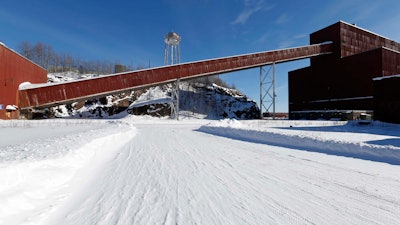
MINNEAPOLIS (AP) — The proposed NewRange Copper Nickel mine in northeastern Minnesota suffered a fresh setback this week when an administrative law judge recommended that state regulators should not reissue a crucial permit for the long-delayed project.
Administrative Law Judge James LaFave said in a ruling late Tuesday that the design for the mine's waste basin won’t adequately prevent water pollution. So, he said, the Department of Natural Resources should not reissue the main “permit to mine” for the project.
The next step is up to the DNR, which can accept or reject the judge's recommendations or impose new conditions for reissuing the permit.
The proposed $1 billion mine has been delayed by a string of court rulings and administrative actions since regulators issued the original permit to mine and other necessary permits in 2018 and 2019. The Minnesota Supreme Court in 2021 ordered the DNR to gather more evidence on whether the mine’s waste basin would keep pollution contained, which led to a five-day hearing before the judge in March.
The project's proposed open-pit mine near Babbitt and processing plant near Hoyt Lakes is a a 50-50 joint venture between PolyMet Mining and Canada-based Teck Resources. The project was renamed NewRange Copper Nickel in February but is still widely known as PolyMet. It seeks to be Minnesota’s first copper-nickel mine, but it has long been stalled by court and regulatory setbacks. Swiss commodities giant Glencore in recent months upped its stake to become the sole owner of PolyMet Mining.
“It’s time for the Governor as well as Minnesota’s state agencies to take a hard look at whether it is time to pull the plug on the PolyMet mine project.” Paula Maccabee, an attorney for the environmental group WaterLegacy, said in a statement.
NewRange spokesman Bruce Richardson said Wednesday that the company was “reviewing the ruling and evaluating our options.” The company says it can produce copper, nickel and platinum-group metals needed for the clean energy economy without harming the environment while creating jobs for northeastern Minnesota.
Other environmental groups also welcomed the ruling. They say the risks of acid mine drainage from the sulfide-bearing ore under northeastern Minnesota pose unacceptable risks to the environment and human health.
The issue in this case was whether the bentonite clay liner that NewRange plans to use to seal its waste basin would adequately contain the reactive mine waste, known as tailings, and keep oxygen and water out. The judge concluded that it was not a “practical and workable” way to render the tailings nonreactive or to keep water out of them over time.
“The crux of the issue is simple: Will the method to contain the waste work? The evidence is clear, and the judge’s ruling is clear: No," said Chris Knopf, executive director of Friends of the Boundary Waters Wilderness.
Several other major obstacles to the project also remain unresolved. The Minnesota Supreme Court ruled in August that the Minnesota Pollution Control Agency improperly granted the main water quality permit, saying state regulators not only ignored concerns from the federal Environmental Protection Agency but attempted to conceal EPA warnings from the public. The U.S. Army Corps of Engineers in June revoked a wetlands destruction permit, saying it did not comply with water quality standards set by a sovereign downstream tribe. Also in June, the state Supreme Court reinstated an appeal by environmentalists of the project's air quality permit.
“This is yet another repudiation of the permits issued to PolyMet, and should be the final nail in the coffin of this failed proposal,” said Kathryn Hoffman, CEO of the Minnesota Center for Environmental Advocacy.






















